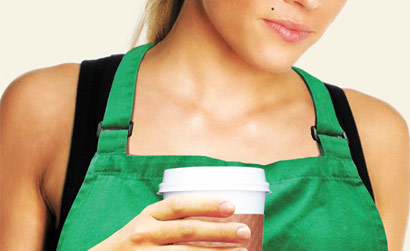
Citibank and Starbucks are not the only businesses affected by workplace harassment in recent times, however. American Apparel, the clothing brand known for its rather risqué advertisements, has faced public employee discrimination charges.
According to numerous employee complaints from July, 2009, and a Gawker exposé this past June—which included internal documents and photographs—American Apparel employees have alleged that superiors judged them on their looks, and in fact, employment policies were based on appearance. Instead of firing employees for distracting coworkers with their curvy physiques, however, the vertically integrated company allegedly fired people because they were deemed unattractive.
“The company looks for people who understand the brand, know how to present themselves, and can communicate the brand’s style to its customers,” Peter Schey, the company’s attorney, tells the Press. “New employees are not hired and existing employees are not retained or promoted based upon their attractiveness. Retail job candidates are hired and existing retail employees are retained based upon an assessment of their ability to sell the company’s product.”
An American Apparel manager told Gawker that store managers had to take group photos of employees to be reviewed based on looks. Another former manager sent the magazine a copy of candidate rules, detailing the way in which job seekers should attach head to toe photographs to their applications. Other employees complained of extreme appearance critiquing.
BEAUTY AND THE BEAST
As the effects of the beauty bias pop up all over the labor market, psychologists say that hiring managers are not specifically the ones to blame, but rather human nature.
“There is lots of evidence that all stereotypes operate automatically, unconsciously,” says Deborah Prentice, Ph.D, professor and chair of the department of psychology at Princeton University. “[And] there is an attractiveness stereotype, such that we generally think attractive people have lots of other good qualities—called the halo effect.”
The halo effect is a bias affecting judgments of performance based on a first impression. As a result, hiring managers may consider physically attractive applicants automatically qualified despite their résumé credentials. The Press’ experiment results, which found that unattractive women with strong resumes are passed over for more attractive women, arrived at similar conclusions
Dr. Paul E. Levy, professor and chair of the Department of Psychology at the University of Akron, conducted his own study with Lisa Drogosz, psychologist supervisor at Northeast Pre-Release Center. Their article, “Another Look at the Effects of Appearance, Gender, and Job Type on Performance-Based Decisions,” found that attractive men and women were given overall higher ratings for three jobs: police officer, journalist and nurse. Good looks were beneficial regardless of job type or gender.
“[Our] study demonstrated that people who are more attractive are rated more favorably,” Levy says. “It’s not just in the selection context, in terms of hiring, but it’s also been verified in studies in terms of performance appraisal. So attractive employees are sometimes rated more favorably than unattractive employees, and there’s some data to support that as well.”
Other studies have shown that attractive people may appear more helpful-looking, are assigned lower bails and may get a leg up in the job market. And with today’s economy, almost everybody is looking for an extra boost.
“It’s a very weak job market,” says Pearl Kamer, chief economist of the Long Island Association. “We have turned the corner in the sense that we’re no longer losing jobs on a year-to-year basis. But, we’re gaining relatively few jobs on a year-to-year basis so that the rebound has been very weak.”
This pressure puts workers across the country at risk, subject to the beauty bias, as employers fill what seems like an ever-shrinking number of job openings. And Long Island, the Press has found, is no exception.
“Anytime there are limited resources, and there are limited jobs right now, all kinds of factors come into play,” Levy says. “When a company has tons of applicants for just a couple of positions they can be pretty selective. We like to think they’re going to select the person who has the chance of being most competent but sometimes [there are] other things, bias, those judgments, and I think attractiveness is one of those things.”
The lowest point in this business cycle hit around May, Kamer says, and over the next three to five years job growth will accelerate, regaining those posts lost in the recession. In landing a new position in the upcoming months, it’s important to focus on both performance and appearance.
“Make sure you have skills for the jobs you’re applying,” Kramer says. “If it’s a business, make sure you’re dressed appropriately. Your appearance should be as attractive as possible… Beyond that, I think the employer begins to look at skill sets.”
Nancy Schuman, vice president at Lloyd Staffing (and Press contributing writer), offers similar advice.
“Grooming in general is important—someone should be well put together, appropriate interview attire, good hygiene, etc. [These] are all factors that impact a decision to refer a candidate for hire,” she says.
So in addition to meeting job requirements and perfecting a résumé, job seekers should do a careful once over before heading out the door. Today’s first impression goes beyond just a suit and résumé, influencing how employers’ rate our qualifications before we even open our mouths.
But sometimes this can backfire. Alfano and Lorenzana’s good looks exposed the ugly side of the workforce—discrimination, harassment and retaliation.
The importance of appearance may be hanging around for years to come.
“[Attractiveness] is something [that] tends to affect…our decisions; it’s pretty quick processing,” Levy explains. “I’m not sure that it’s going to go away.”
Unfortunately, neither will the double-edged sword of attractiveness in the workplace.
“I know that because of the way I look I get treated differently,” Alfano says. “I had a customer who had threatened me about killing my daughter, and I told them about this customer, and they did nothing. It was just gross negligence and ignorance, that’s what it was.”




